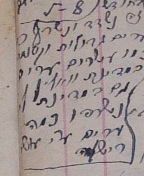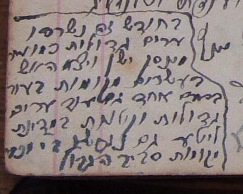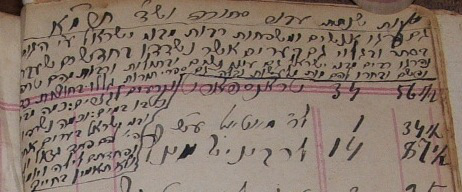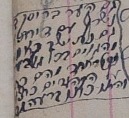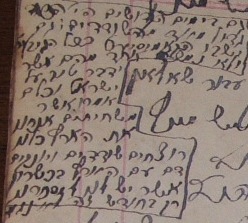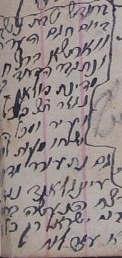R’ Baruch Meir records in detail the Russian Pogroms of 1881 - 1882 and related events. To evade Russian censors, Jewish newspapers in Russia referred to these events as Sufot BaNegev: Storms in the Negev.
From the diary:
This month, Nissan, the government started issuing again harsh dictates and Jews were expelled from several places in Russia and several towns were burnt down in Lita [Lithuania] and Volyn [a district in Ukraine].
In all these places the Gentiles organized and met with the people of authority to slander the Jews. All of them said that we are a curse to the State and that we suck the blood of the State. As a result the dictates intensified.
Following the assassination of Tsar Alexander II in March, 1881, the Russian Minister of Interior Mikhail Loris-Melikov resigned and was replaced by Nikolay Pavlovich Ignatyev, who initiated a new policy of anti-Semitism:
This month, Iyar, the Minister (Michael) Loris Melikov resigned and the oppressor (Nikolay Pavloviç) Ignatyev (his name be cursed) took his place. In many places ministers were replaced by worse ministers.”
The new policy led directly to pogroms:
This month big and small towns were raided and burnt down as well as twenty towns in Volyn. In Lita and Volyn several towns were burnt down by villains.
This month, Tamuz, in several big towns such as Minsk, a fire broke in twenty locations in town all at once, and also in other big and small towns in Lita and places around the border.
It was Summer: the Hebrew month of Tamuz fell in that year between the end of June to the end of July.
Many Jewish people and families were murdered stealthily or in the open. In the towns that were raided in the previous months, many of the Jews were killed. The raiders also raped women and virgins and many of the women committed suicide and chose to die rather than bear the shame. In addition, Torah scrolls were dragged in the streets and torn to pieces, some became wet and some were burnt. Jews in other towns were terrified day and night and did not believe they would survive.
The violence came to his previous home, Brisk:
The town of Brisk D’Lita was burnt down, including my brother’s house. There are Gentiles everywhere, they are feared by the Jews and the situation is bad.
And to his current home, Mezritch:
On the 23 of Elul (17 September 1881), the honorable Mr. Israel Alering, his wife and daughter were killed here in Mezritch by the gentiles. There was a raid in Marinpol [Ukraine]. Jews were expelled from several places.
Even during the Holy Days they were distressed because of the raiders. The Commissaire and all the people in authority met together and none of them talked in favor of the Jews and all said that we are a plague to the country, meaning that we murder and rob and suck the blood of the country using our talents. There was no end to it this month. Fear reigned because of the slandering words of the commissar against the Jews.
Mourning these events, the Jewish leadership declared a public fast in all the Jewish towns.
Baruch Meir paused to record some pleasant family news:
On the 19th of Kheshvan [November] 1881 my wife gave birth to a daughter and we named her Liba Sarah.
But the pogroms continued:
On the month of Tevet [December] Warsaw was stricken with riots and killings on the Christian Holiday and fear spread all over Poland. Public fast was declared in every town and money was sent from every town and even though England was stirred by the murdering of the Jews this did not help us.
The London Times reported on the various Pogroms. The event on the Christian Holiday was when a false alarm spread among the people in the church and some were trying to escape. It was a pretext to raid the Jewish quarter and families lost their houses and stores.
| Notes: Lithuania: the historic Jewish region, as distinct from the modern country. |





